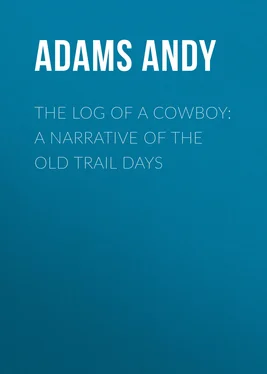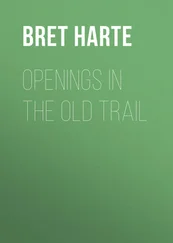Andy Adams - The Log of a Cowboy - A Narrative of the Old Trail Days
Здесь есть возможность читать онлайн «Andy Adams - The Log of a Cowboy - A Narrative of the Old Trail Days» — ознакомительный отрывок электронной книги совершенно бесплатно, а после прочтения отрывка купить полную версию. В некоторых случаях можно слушать аудио, скачать через торрент в формате fb2 и присутствует краткое содержание. Жанр: foreign_prose, foreign_antique, на английском языке. Описание произведения, (предисловие) а так же отзывы посетителей доступны на портале библиотеки ЛибКат.
- Название:The Log of a Cowboy: A Narrative of the Old Trail Days
- Автор:
- Жанр:
- Год:неизвестен
- ISBN:нет данных
- Рейтинг книги:3 / 5. Голосов: 1
-
Избранное:Добавить в избранное
- Отзывы:
-
Ваша оценка:
- 60
- 1
- 2
- 3
- 4
- 5
The Log of a Cowboy: A Narrative of the Old Trail Days: краткое содержание, описание и аннотация
Предлагаем к чтению аннотацию, описание, краткое содержание или предисловие (зависит от того, что написал сам автор книги «The Log of a Cowboy: A Narrative of the Old Trail Days»). Если вы не нашли необходимую информацию о книге — напишите в комментариях, мы постараемся отыскать её.
The Log of a Cowboy: A Narrative of the Old Trail Days — читать онлайн ознакомительный отрывок
Ниже представлен текст книги, разбитый по страницам. Система сохранения места последней прочитанной страницы, позволяет с удобством читать онлайн бесплатно книгу «The Log of a Cowboy: A Narrative of the Old Trail Days», без необходимости каждый раз заново искать на чём Вы остановились. Поставьте закладку, и сможете в любой момент перейти на страницу, на которой закончили чтение.
Интервал:
Закладка:
Andy Adams
The Log of a Cowboy: A Narrative of the Old Trail Days
CHAPTER I
UP THE TRAIL
Just why my father moved, at the close of the civil war, from Georgia to Texas, is to this good hour a mystery to me. While we did not exactly belong to the poor whites, we classed with them in poverty, being renters; but I am inclined to think my parents were intellectually superior to that common type of the South. Both were foreign born, my mother being Scotch and my father a north of Ireland man,—as I remember him, now, impulsive, hasty in action, and slow to confess a fault. It was his impulsiveness that led him to volunteer and serve four years in the Confederate army,—trying years to my mother, with a brood of seven children to feed, garb, and house. The war brought me my initiation as a cowboy, of which I have now, after the long lapse of years, the greater portion of which were spent with cattle, a distinct recollection. Sherman's army, in its march to the sea, passed through our county, devastating that section for miles in its passing.
Foraging parties scoured the country on either side of its path. My mother had warning in time and set her house in order. Our work stock consisted of two yoke of oxen, while our cattle numbered three cows, and for saving them from the foragers credit must be given to my mother's generalship. There was a wild canebrake, in which the cattle fed, several hundred acres in extent, about a mile from our little farm, and it was necessary to bell them in order to locate them when wanted. But the cows were in the habit of coming up to be milked, and a soldier can hear a bell as well as any one. I was a lad of eight at the time, and while my two older brothers worked our few fields, I was sent into the canebrake to herd the cattle. We had removed the bells from the oxen and cows, but one ox was belled after darkness each evening, to be unbelled again at daybreak. I always carried the bell with me, stuffed with grass, in order to have it at hand when wanted.
During the first few days of the raid, a number of mounted foraging parties passed our house, but its poverty was all too apparent, and nothing was molested. Several of these parties were driving herds of cattle and work stock of every description, while by day and by night gins and plantation houses were being given to the flames. Our one-roomed log cabin was spared, due to the ingenious tale told by my mother as to the whereabouts of my father; and yet she taught her children to fear God and tell the truth. My vigil was trying to one of my years, for the days seemed like weeks, but the importance of hiding our cattle was thoroughly impressed upon my mind. Food was secretly brought to me, and under cover of darkness, my mother and eldest brother would come and milk the cows, when we would all return home together. Then, before daybreak, we would be in the cane listening for the first tinkle, to find the cattle and remove the bell. And my day's work commenced anew.
Only once did I come near betraying my trust. About the middle of the third day I grew very hungry, and as the cattle were lying down, I crept to the edge of the canebrake to see if my dinner was not forthcoming. Soldiers were in sight, which explained everything. Concealed in the rank cane I stood and watched them. Suddenly a squad of five or six turned a point of the brake and rode within fifty feet of me. I stood like a stone statue, my concealment being perfect. After they had passed, I took a step forward, the better to watch them as they rode away, when the grass dropped out of the bell and it clattered. A red-whiskered soldier heard the tinkle, and wheeling his horse, rode back. I grasped the clapper and lay flat on the ground, my heart beating like a trip-hammer. He rode within twenty feet of me, peering into the thicket of cane, and not seeing anything unusual, turned and galloped away after his companions. Then the lesson, taught me by my mother, of being "faithful over a few things," flashed through my mind, and though our cattle were spared to us, I felt very guilty.
Another vivid recollection of those boyhood days in Georgia was the return of my father from the army. The news of Lee's surrender had reached us, and all of us watched for his coming. Though he was long delayed, when at last he did come riding home on a swallow-marked brown mule, he was a conquering hero to us children. We had never owned a horse, and he assured us that the animal was his own, and by turns set us on the tired mule's back. He explained to mother and us children how, though he was an infantryman, he came into possession of the animal. Now, however, with my mature years and knowledge of brands, I regret to state that the mule had not been condemned and was in the "U.S." brand. A story which Priest, "The Rebel," once told me throws some light on the matter; he asserted that all good soldiers would steal. "Can you take the city of St. Louis?" was asked of General Price. "I don't know as I can take it," replied the general to his consulting superiors, "but if you will give me Louisiana troops, I'll agree to steal it."
Though my father had lost nothing by the war, he was impatient to go to a new country. Many of his former comrades were going to Texas, and, as our worldly possessions were movable, to Texas we started. Our four oxen were yoked to the wagon, in which our few household effects were loaded and in which mother and the smaller children rode, and with the cows, dogs, and elder boys bringing up the rear, our caravan started, my father riding the mule and driving the oxen. It was an entire summer's trip, full of incident, privation, and hardship. The stock fared well, but several times we were compelled to halt and secure work in order to supply our limited larder. Through certain sections, however, fish and game were abundant. I remember the enthusiasm we all felt when we reached the Sabine River, and for the first time viewed the promised land. It was at a ferry, and the sluggish river was deep. When my father informed the ferryman that he had no money with which to pay the ferriage, the latter turned on him remarking, sarcastically: "What, no money? My dear sir, it certainly can't make much difference to a man which side of the river he's on, when he has no money."
Nothing daunted by this rebuff, my father argued the point at some length, when the ferryman relented so far as to inform him that ten miles higher up, the river was fordable. We arrived at the ford the next day. My father rode across and back, testing the stage of the water and the river's bottom before driving the wagon in. Then taking one of the older boys behind him on the mule in order to lighten the wagon, he drove the oxen into the river. Near the middle the water was deep enough to reach the wagon box, but with shoutings and a free application of the gad, we hurried through in safety. One of the wheel oxen, a black steer which we called "Pop-eye," could be ridden, and I straddled him in fording, laving my sunburned feet in the cool water. The cows were driven over next, the dogs swimming, and at last, bag and baggage, we were in Texas.
We reached the Colorado River early in the fall, where we stopped and picked cotton for several months, making quite a bit of money, and near Christmas reached our final destination on the San Antonio River, where we took up land and built a house. That was a happy home; the country was new and supplied our simple wants; we had milk and honey, and, though the fig tree was absent, along the river grew endless quantities of mustang grapes. At that time the San Antonio valley was principally a cattle country, and as the boys of our family grew old enough the fascination of a horse and saddle was too strong to be resisted. My two older brothers went first, but my father and mother made strenuous efforts to keep me at home, and did so until I was sixteen. I suppose it is natural for every country boy to be fascinated with some other occupation than the one to which he is bred. In my early teens, I always thought I should like either to drive six horses to a stage or clerk in a store, and if I could have attained either of those lofty heights, at that age, I would have asked no more. So my father, rather than see me follow in the footsteps of my older brothers, secured me a situation in a village store some twenty miles distant. The storekeeper was a fellow countryman of my father—from the same county in Ireland, in fact—and I was duly elated on getting away from home to the life of the village.
Читать дальшеИнтервал:
Закладка:
Похожие книги на «The Log of a Cowboy: A Narrative of the Old Trail Days»
Представляем Вашему вниманию похожие книги на «The Log of a Cowboy: A Narrative of the Old Trail Days» списком для выбора. Мы отобрали схожую по названию и смыслу литературу в надежде предоставить читателям больше вариантов отыскать новые, интересные, ещё непрочитанные произведения.
Обсуждение, отзывы о книге «The Log of a Cowboy: A Narrative of the Old Trail Days» и просто собственные мнения читателей. Оставьте ваши комментарии, напишите, что Вы думаете о произведении, его смысле или главных героях. Укажите что конкретно понравилось, а что нет, и почему Вы так считаете.












